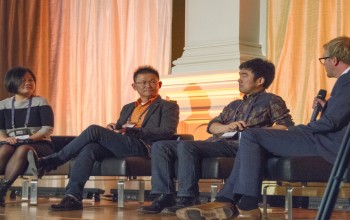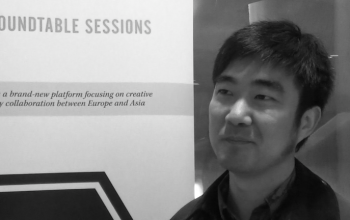Isabelle Glachant is a Beijing based film producer who’s produced films with well known Chinese directors such as Wang Xiaoshuai, Lou Ye and Lu Chuan. EARS interviewed Isabelle to get insight into the latest trends in China’s film industry.
Hey, who are you and what do you do?
My name is Isabelle Glachant and I’m an independent producer based in Beijing. I’ve lived there for more than ten years now, producing Chinese directors like Wang Xiaoshuai, Lou Ye , Lu Chuan. Since January I’ve represented Unifrance, an association that promotes French in China, Hong Kong and Taiwan.
I fell in love with Hong Kong cinema while watching Jackie Chan films
How did you end up in China?
I was looking for a place as far away from France as possible. China was far enough. I learned Chinese and fell in love with Hong Kong cinema while watching Jackie Chan films. I discovered Chinese cinema and what is called the 6th generation of directors, who started making movies after the events of 1989
How is the Chinese film industry at the moment?
There wasn’t one until early 2000. Movies were made with public financing and were mostly propaganda, with a few artistic directors like Zhang Yimou and Chen Kaige, whose films were shown at international film festivals. In 2000 the government decided they wanted to help build a Chinese film industry to counter the rising popularity of American films, so they allowed private companies to produce and distribute their own films. Commercial directors like Feng Xiaogang started making films and previously underground directors, like Jia Zhangke, Lou Ye and Wang Xiaoshuai, started having an impact on the legal market. The market continued to grow, so Hong Kong directors and producers moved to Beijing, which resulted in more growth.
The variety of films being made is rich, from very commercial martial arts movies and movies about Shanghai in the 1930s to propaganda movies and small films by indie directors. The indie films are the ones that usually get shown at international festivals or distributed in Europe.
Indie films are the ones that usually get shown at international festivals or distributed in Europe.
How does the government support the industry and what kinds of films does it support?
Unlike in Europe, there is no jury of writers and directors deciding which films to fund. There’s a government bureau, which is financed out of the tax on movie tickets, so most movies they finance are propaganda, films that the government needs. There might be some sort of anniversary coming up and they want a film made that deals with the anniversary in question.
Some directors want the government to provide movies that are internationally successful with support and special subsidies, which would help produce and sell their movies. No such system exists as of yet, so the films that you see at festivals or movie theaters outside China and Hong Kong are all made with private money.
The production companies that finance Chinese movies are often also talent agencies and distributors, They own theaters and control of the distribution chain provides them with the cash they need to finance movies. Product placement is also a very common way to solicit cash advances during production. Television and internet sales come into the picture after the film has already been produced and distributed, so they are not a source for financing a production.
If you ask directors what the key to securing financing is, they’ll say you have to be good at karaoke
You’ve worked on art house films. What kind of process is it and how much artistic freedom do you have? How do you finance those films?
In Chinese art house movies the director usually writes the script and often produces the movie, too. Sometimes the director also edits and travels with the movie to try and sell it. The process depends on the director. You have to provide the censors with a treatment or a complete script to get approval. They give you notes on what works and what doesn’t in your submission. Once you have approval from the censors, you can start looking for financing, because people won’t want to get behind a film that is not sure to pass censorship.
If you ask directors, even very commercially successful ones like Lu Chuan, what the key to securing financing is, they’ll say you have to be good at karaoke. Karaoke bars are a popular venue for business negotiations. You need to spend time with the people whose money you need.
It’s a new industry, so a lot of the money comes from other industries. In the case of art house movies, wealthy individuals sometimes help individual directors. Commercial movies usually involve big casts or expensive action scenes, so they rely on different sources.
What kind of problems have you had with censorship?
I usually don’t have problems. You send the script and you’re done with it. It gets complicated if they decide to censor a finished movie. Re-editing, re-recording and re-mixing is expensive. In co-productions, your partners might not understand why you have to simultaneously finish post-production and try and keep it open, in case changes are needed. These kinds of problems are new to most people working on major international productions.
We like characterization and strong, human stories. The Chinese audience right now wants big, escapist entertainment.
Do you think the popularity of Chinese films in the West will increase?
I would say their popularity has been on the wane over the last few years. Korean and Japanese movies are gaining in popularity. The local Chinese market has become stronger and the local audience’s taste seems to differ from our tastes. We like characterization and strong, human stories. The Chinese audience right now wants big, escapist entertainment. In Europe we already get that with American movies.
The Chinese box office grows 30 to 40 percent annually. Movie theatres are being built at a rate of about 300 per year and there are still lots of cities that don’t have theaters, so the potential is huge. The growth applies to only one kind of film, however: American-style, 3D entertainment.
Building art house movie theaters is the challenge, to see if Chinese films can survive in that market, too, as well as create a space for European art house movies in China.
What kinds of stories do Chinese filmmakers want to tell?
Period stories are the easiest to get past the censors right now. Shanghai in the 1930s and 1940s, before the birth of the new China in the form of the Communist takeover of 1949, is a popular subject. Films about emperors, martial arts and the Japanese occupation are popular, too, probably for the same reason. Some romantic comedies have been successful. Rom-coms cost 2 to 3 million yuan to make and can gross 100 million.
Whether these are the stories directors want to tell is a good question. In many cases, these are the movies they end up making, because these are the movies they are asked to make.
Some commercial genre films are hard to do, like cop films and thrillers, because you can’t scare the audience. Directors try to work around these restrictions, but this year both commercial and art house directors have also approached the censors about opening up some subjects. They feel that the limits placed on them are preventing Chinese films from really competing with foreign productions.
Not all films in China receive the same treatment from the pirates
How big a problem is piracy for Chinese cinema?
Piracy is a problem for big productions. A Zhang Yimou film really needs to make the money invested back. The weird thing is that when a Zhang Yimou film comes out, it takes over a month for pirated DVDs to appear. For art house movies, it takes about two days. And we really need to put people in the seats at cinemas to recoup our little investment.
It’s funny that not all films receive the same treatment from the pirates. Piracy provides a lot of Chinese directors with access to European films that they wouldn’t otherwise see in theaters or TV, so there are some positives sides to it, too.
Are there limits to how many foreign films can be imported?
The Chinese government used to limit access to the Chinese market for purely political reasons. They wanted to protect the people in the countryside from images that are detrimental to them. Now the reasons are commercial. They wish to protect the Chinese industry until it’s developed enough to face foreign competition.
Currently, 34 films are distributed on a shared revenue profit program and 30 films on a flat fee program. About one third of films screened are foreign: 100-120 Chinese, 60-70 foreign, annually.
The Chinese are more interested in visibility than finances. They want China to be seen in co-production movies, so the films often have to be set in China.
What counts as a Chinese film in co-production scenarios?
Chinese co-productions are very different from the European ones. In Europe, co-production treaties control spending in each treaty party’s country, number of workers, languages used, etc. China doesn’t use treaties, which has allowed the Americans to work in China, as opposed to the Europeans, because they don’t need treaties. The Chinese are more interested in visibility than finances. They want China to be seen in co-production movies, so the films often have to be set in China. They want Chinese leads or, at the very least, some other major characters. They want the movie to promote China. If these conditions are met, they will give you access to the Chinese market and you can release your movies outside the quota for foreign films.
Have international stars acted in Chinese films?
Some Americans stars, yes. Christian Bale acted in a hit Zhang Yimou film that was released last December. It’s a movie set in the 1930s, during the Japanese occupation and the Nanking massacre. It didn’t do that great outside China, though. 10 years ago Feng Xiaogang did a movie with Donald Sutherland, but he said he’ll never do it again. He’d hoped the film would travel better. It didn’t and it was less successful in the local market than his earlier movies.
There have been a few cases, but it’s not a common model.







